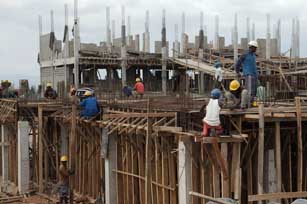
BY CLAUDE RICHLI
Not every Adventist turned against his or her neighbor,
and not every missionary left the country with an armed convoy. When 270
international students, faculty, and missionaries left the campus of the Adventist
University of Central Africa (AUCA) in Mudende, some staff members
stayed behind, buried the bodies, kept the school farm going, and protected the
property from further looting.
1
One man by the name of Sosthène saved the lives of 104 people by hiding them on his property at the peril of his own life. One of them, Amon Rugelinyange, went on to become president of the Rwanda Union Mission.
But there is one man who went far beyond the call of
duty. At the time of the genocide, Carl Wilkens was director of the Adventist
Development and Relief Agency (ADRA) in Kigali. He and his wife, Teresa, had
spent about four years in Rwanda. At the beginning of 1994, they could feel the
tension building to the point where things could blow up. They wrestled with
the question: What will we do then? After much prayer, he and Teresa decided
that no matter what, Carl would stay while his family would evacuate. When the
armored truck came to pick up his wife and three children, he resolutely said:
“I’m not leaving!” The consular officer who was on the convoy was so shocked
that she made him sign a release, taking sole responsibility for whatever his
fate would be.
2 He
went on to become the only American citizen left in the country, and he stayed
until July. Why would he put his life at risk in such a chaotic situation? He
did it in a spirit of solidarity with the Rwandese, and in order to protect the
two Tutsi household workers who were under his roof. Even though the ADRA offices
were looted and the trucks stolen, he walked for hours day after day in
war-torn Kigali to visit orphanages and to arrange for whatever help he could.
While some Christians in Rwanda turned into “savage beasts,” he chose to follow
the selfless example of Christ, putting his life on the line for the sake of
his neighbor.

In a recent interview with Adventist Review, Carl admits that “our denomination failed
horribly in the genocide.. . .We need
to address the issue: why? . . . Extremists had taken over the government to
accomplish their goal; everything from top to bottom had been taken over. So we
need to ask ourselves, ‘What resources did the church have, its chains of
command, etc.,’ and ‘How could we have taken advantage of these resources to
prevent something like this from happening? Has the church learned from the
genocide?’ We need to understand what happened, perhaps make a case study out
of it and teach it, especially since we interpret the genocide as a ‘trailer’
of end-time events.”
Today, Carl is an educator and speaks on behalf of a
small foundation he and his wife started called “World Outside My Shoes.” His
Web site describes his goals as: “To
inspire and equip people to stand up against genocide, racism, and
intolerance.”
3 He speaks in schools and universities, “supporting educators, giving them
the tools to understand human rights and genocides from the vantage point of
having been in the middle of one.” He says that he works “through stories in
order to lead to service, which itself generates stories that lead to more
service. It’s like a circle. We speak to encourage people to act locally,
perhaps among an immigrant community, or globally by contacting your senator
about the war in Eastern Congo or in South Sudan, or to support a college kid
in Turkey who mobilizes people in Syria. We encourage people to make do with
what they have, and not to be defined by what has been taken away from them.”
As for Rwanda, Carl
is very optimistic about its future. “Rwanda is different in that it has now a
functioning government that is becoming a beacon for Africa. I am proud to be
associated with the story of Rwanda, because it’s a story of forgiveness, of
working together. I have seen neighbors forgive each other, such as a woman who
rides on the back of the bike of the man who killed her husband and her
children. There are so many great stories. The government has been focused not
just on punitive justice, but on restorative justice. It is far from perfect,
and while it has been criticized for being too authoritarian, this type of
authoritarianism has a place; how else do you build up this country again?
Meanwhile, health care is now available to the people, there are 70 percent fewer
people dying of malaria than 20 years ago; you have unfiltered Internet
available everywhere, and the country wants to be the first Wi-Fi country in the world!”